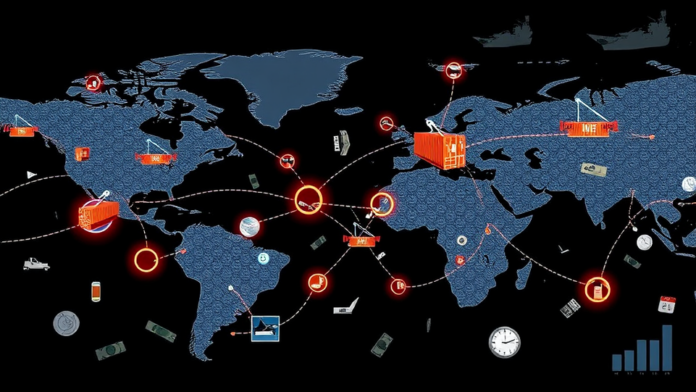Introduction to Global Supply Chain Disruptions
Definition and Overview
Global supply chain disruptions refer to significant interruptions in the flow of goods and services. These disruptions can arise from various factors, including natural disasters, geopolitical tensions, and pandemics. Such events can severely impact businesses, leading to delays and increased costs. Understanding these dynamics is crucial for effective risk management. Awareness is key in navigating these challenges.
Historical Context and Recent Events
Historically, global supply chains have evolved through industrialization and globalization. Recent events, such as the COVID-19 pandemic, have exposed vulnerabilities in these systems. Disruptions have led to significant financial losses for many firms. Understanding these historical trends is essential for strategic planning. Awareness of past events informs future decisions.
Causes of Supply Chain Disruptions
Natural Disasters and Climate Change
Natural disasters and climate change significantly disrupt supply chains. Events like hurricanes and floods can halt production and transportation. These interruptions lead to increased costs and delays. Companies must adapt to these challenges. Proactive measures are essential for resilience. Awareness is crucial for effective planning.
Geopolitical Tensions and Trade Policies
Geopolitical tensions and trade policies cxn severely impact supply chains. Tariffs and sanctions disrupt the flow of goods. These barriers often lead to increased operational costs. Companies must navigate complex regulatory environments. Strategic adjustments are necessary for compliance. Awareness of these factors is vital for success.
Impact on Global Trade
Changes in Trade Volumes
Here are 10 trending article titles for a financial website based on the latest news and analysis of financial trends: No input data
Shifts in Trade Routes and Partnerships
Shifts in trade routes and partnerships significantly affect global trade dynamics. Companies are increasingly seeking alternative pathways to mitigate risks. This realignment can lead to enhanced efficiency and reduced costs. Strategic partnerships are essential for navigating these changes. Flexibility is crucial in adapting to new market conditions. Awareness of these shifts is vital for informed decision-making.
Effects on Businesses
Operational Challenges and Costs
Operational challenges significantly increase costs for businesses. Disruptions can lead to inefficiencies in production and logistics. These inefficiencies often result in delayed deliveries and lost revenue. Companies must invest in contingency plans to mitigate risks. Strategic planning is essential for maintaining competitiveness. Awareness of these challenges is crucial for success.
Impact on Inventory Management
Supply chain disruptions significantly affect inventory management practices. Companies face challenges in maintaining optimal stock levels. These fluctuations can lead to overstocking or stockouts. Effective forecasting becomes increasingly difficult under these conditions. Strategic adjustments are necessary for operational efficiency. Awareness of inventory dynamics is essential for success.
Consumer Behavior Changes
Shifts in Demand for Products
Shifts in demand for products reflect changing consumer preferences. Economic factors and social trends influence purchasing decisions. These changes can lead to increased competition among brands. Companies must adapt their strategies to meet evolving needs. Understanding consumer behavior is crucial for market success. Awareness drives effective product development and marketing.
Increased Focus on Local Sourcing
Increased focus on local sourcing reflects changing consumer values. Many consumers prioritize sustainability and community support. This shift can enhance brand loyalty and trust. Companies are adapting their supply chains accordingly. Local sourcing often reduces transportation costs. Awareness of these trends is essential for competitiveness.
Financial Implications for Companies
Profit Margins and Pricing Strategies
Profit margins and pricing strategies are critical for financial health. Companies must carefully analyze costs and market conditions. Adjusting prices can directly impact profitability. Strategic pricing helps maintain competitive advantage. Understanding consumer behavior is essential for effective pricing. Awareness of market trends drives informed decision-making.
Investment in Supply Chain Resilience
Investment in supply chain resilience is essential for long-term stability. Companies must allocate resources to enhance flexibility and responsiveness. Key areas for investment include technology, training, and supplier diversification. These investments can mitigate risks and reduce costs. Awareness of potential disruptions is crucial for planning. Strategic investments yield significant returns.
Strategies for Mitigating Disruptions
Diversification of Suppliers
Diversification of suppliers is a critical strategy for mitigating disruptions. By engaging multiple suppliers, companies can reduce dependency on a single source. This approach enhances supply chain resilience and flexibility. It also allows for competitive pricing and improved quality. Companies should assess supplier capabilities regularly. Awareness of market dynamics is essential for effective diversification.
Adoption of Technology and Automation
Adoption of technology and automation enhances operational efficiency. Implementing advanced systems can streamline processes and reduce errors. This approach minimizes the impact of disruptions on supply chains. Companies should invest in data analytics and AI solutions. Awareness of technological advancements is crucial for competitiveness. Strategic implementation drives significant improvements.
Future Outlook and Trends
Predicted Changes in Supply Chain Dynamics
Predicted changes in supply chain dynamics will significantly reshape industries. Increased reliance on technology will enhance efficiency and transparency. Companies are expected to prioritize sustainability in sourcing and logistics. This shift can lead to reduced environmental impact. Adapting to these trends is essential for competitiveness. Awareness of future developments is crucial for strategic planning.
Long-term Implications for Global Business
Long-term implications for global business will reshape strategies. Companies must adapt to evolving consumer preferences and market conditions. Sustainability will become a core focus for many organizations. Awareness of these trends is essential for future success. Strategic planning will drive competitive advantage.

